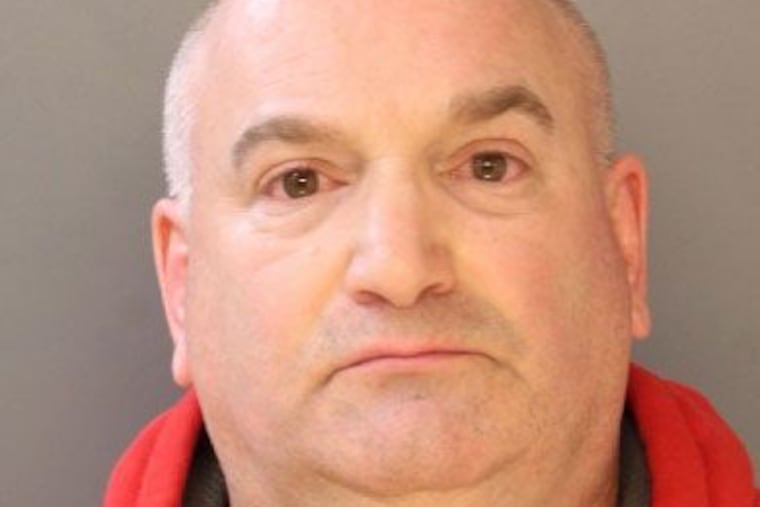Ex-Philly detective Philip Nordo had a big role in a murder trial — while awaiting his own trial
Nordo, awaiting trial on allegations that he sexually assaulted male witnesses during his career, was not called to testify in a murder case he helped to investigate. But his name loomed like a cloud over the trial, which ended with convictions this week.

Former Philadelphia homicide detective Philip Nordo was not called to testify in the murder trial of Tim Jordan and Kharee Muhammad, a case he had helped investigate five years ago.
But Nordo’s name loomed like a cloud over the three-week trial, which ended Friday when both men were convicted of second-degree murder and related counts.
The disgraced ex-cop — who was fired in 2017 and is awaiting trial on allegations that he sexually assaulted male witnesses during his investigations — took a statement from a man who drove a getaway car in the 2014 robbery-turned-killing in Feltonville. Video of that interrogation was played for the jury.
Nordo’s mug shot was entered into evidence by Jordan’s defense lawyer, who regularly mentioned his name when questioning witnesses.
And a cooperating coconspirator testified that people in jail with him, hoping to damage the case against Jordan and Muhammad, had urged him to say that Nordo coerced his testimony.
The case is believed to be the last open prosecution tied to Nordo, and it is another unusual example of how the tainted career of a once-prolific investigator has impacted the city’s criminal justice system. The prosecution came not only as Nordo is jailed until his own trial, but also as the District Attorney’s Office continues to review old convictions he helped secure to determine if they should be thrown out for misconduct.
At least six cases in which Nordo was involved have been downgraded or overturned, including one against a man with a diagnosed intellectual disability, Sherman McCoy, whose attorney said Nordo coerced him into falsely confessing to a 2013 killing. Prosecutors in May agreed that McCoy’s conviction and automatic life sentence should be vacated, and a judge approved his release from prison.
It is not clear how many other cases tied to Nordo may be under review, but defense attorney Jerome Brown said he has “four or five” appeals pending with some connection to Nordo.
Meanwhile, five people in the past year have sued Nordo in federal court, claiming he used coercive or abusive tactics to secure wrongful convictions. One of those lawsuits was settled in July for $200,000, according to the city’s Law Department, while others are pending.
The District Attorney’s Office in February charged Nordo with sexually assaulting male witnesses during investigations and intimidating them to remain silent, and he faces decades behind bars if convicted.
Nordo’s attorney, Michael van der Veen, has said that Nordo maintains he is innocent. A trial is scheduled for March.
District Attorney Larry Krasner made police accountability a pillar of his campaign for office two years ago, and has hinted that his office may soon reveal more “systemic corruption” by police detectives. Prosecutors have said they are reviewing the work of two former investigators not connected to Nordo, whose cases largely date to the 1990s.
Van der Veen said he believes Krasner’s office was right to continue pursuing the case against Jordan and Muhammad, because he believes “all of the work Detective Nordo did as a homicide detective in this city is unassailable and was righteous in its execution. All of [it].”
The District Attorney’s Office at trial, however, sought to de-emphasize Nordo’s role in the investigation, leaning instead on testimony from two alleged coconspirators, cell-phone records, and surveillance video.
“The evidence in this case shows that what [the coconspirators] say happened, happened,” Assistant District Attorney Cydney Pope told jurors during opening arguments.
The coconspirators — whom Pope requested that The Inquirer not identify because they had been threatened, and one of them was assaulted while in custody — testified that they and three other men, Jordan, Muhammad, and Brandon Munroe, decided to try to rob a drug house on the 400 block of West Caskey Street in June 2014.
One of the coconspirators testified that he drove to the area, then let Jordan, Muhammad, and Munroe — who pleaded guilty earlier this year — out of the car. A man at the house, Moises Mora, was fatally shot during the robbery attempt.
A few minutes later, the coconspirator said, the three men got back into the vehicle and he drove them back to the 1700 block of Dauphin Street in North Philadelphia, where they went their separate ways.
Hours later, the coconspirator said, Nordo arrived at his house and arrested him, acting on a tip from a good Samaritan about the getaway car. The man testified that Nordo, during his interrogation, regularly told him he was lying, but that he did not feel pressured or coerced.
Years later, after Nordo was fired from the Police Department, the man said, prosecutors again questioned him to ask if Nordo had behaved inappropriately during their interactions.
“No,” he said he told them. “Nothing happened.”
Other witnesses, including Homicide Detective Billy Golphin, testified that Nordo was involved in a few other minor portions of the investigation, such as an unsuccessful effort to canvass the neighborhood for people who might have seen what happened.
Defense attorneys Eileen Hurley and W. Fred Harrison Jr. said they considered calling Nordo to testify but decided not to.
Jurors returned their verdict after about eight hours of deliberation. Jordan and Muhammad, both 27, are scheduled to be sentenced in February. Their convictions carry automatic life prison terms.